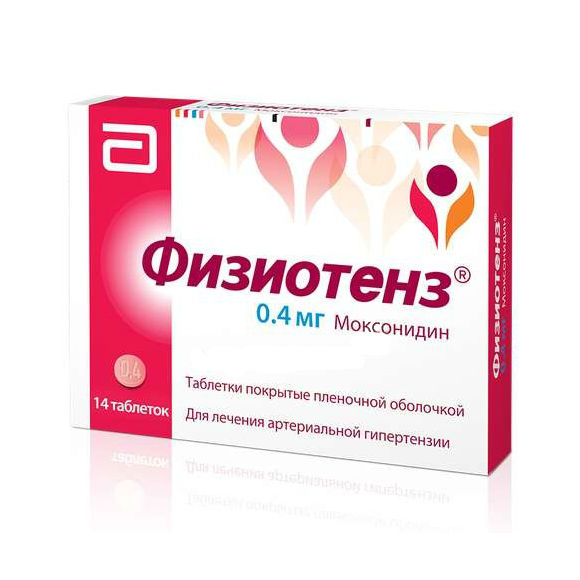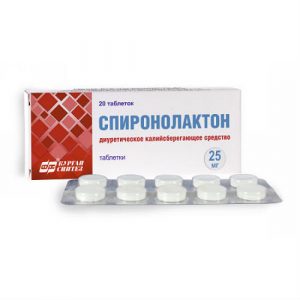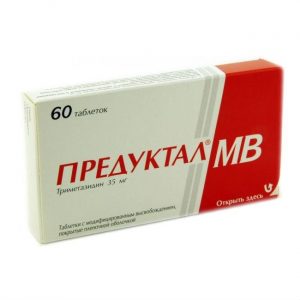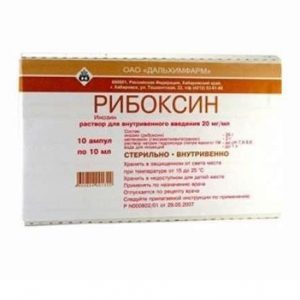Description
Release form
Tablets.
Packing
14 pcs.
Pharmacological action
Moxonidine is a hypotensive drug with a central mechanism of action. In the brain stem structures (the rostral layer of the lateral ventricles), moxonidine selectively stimulates the imidazoline-sensitive receptors involved in the tonic and reflex regulation of the sympathetic nervous system. Stimulation of imidazoline receptors reduces peripheral sympathetic activity and blood pressure (BP).
Moxonidine differs from other sympatholytic antihypertensive agents in lower affinity for a2-adrenergic receptors, which explains the lower likelihood of developing a sedative effect and dry mouth.
Taking moxonidine leads to a decrease in systemic vascular resistance and blood pressure. The hypotensive effect of moxonidine is confirmed in double-blind, placebo-controlled, randomized trials.
Moxonidine improves the insulin sensitivity index (compared to placebo) by 21% in patients with obesity, insulin resistance, and moderate arterial hypertension.
Pharmacokinetics
Absorption: After oral administration, moxonidine is rapidly and almost completely absorbed in the upper gastrointestinal tract. Absolute bioavailability is approximately 88%. The time to reach maximum concentration is about 1 hour. Eating does not affect the pharmacokinetics of the drug.
Distribution of
Communication with plasma proteins is 7.2%.
Metabolism
The main metabolite is dehydrogenated moxonidine. The pharmacodynamic activity of dehydrogenated moxonidine is about 10% compared with moxonidine.
Excretion
The elimination half-life (T1 / 2) of moxonidine and the metabolite is 2.5 and 5 hours, respectively. Within 24 hours, over 90% of moxonidine is excreted by the kidneys (about 78% unchanged and 13% in the form of dehydrromoxonidine, other metabolites in the urine do not exceed 8% of the dose). Less than 1% of the dose is excreted through the intestines.
Pharmacokinetics in patients with arterial hypertension: Compared with healthy volunteers, in patients with arterial hypertension there is no change in the pharmacokinetics of moxonidine.
Pharmacokinetics in the elderly
Clinically insignificant changes in the pharmacokinetic parameters of moxonidine in elderly patients have been noted, probably due to a decrease in its metabolic rate and / or slightly higher bioavailability.
Pharmacokinetics in children
Moxonidine is not recommended for use in persons under 18 years of age, and therefore pharmacokinetic studies have not been conducted in this group.
Pharmacokinetics for renal failure
Excretion of moxonidine is significantly correlated with creatinine clearance (CC). In patients with moderate renal failure (CC in the range of 30-60 ml / min), equilibrium plasma concentrations and final T1 / 2 are approximately 2 and 1.5 times higher than in individuals with normal renal function (CC more than 90 ml / min.). In patients with severe renal failure (CC less than 30 ml / min.), Equilibrium plasma concentrations and final T1 / 2 are 3 times higher than in patients with normal renal function. The administration of multiple doses of moxonidine leads to predictable cumulation in the body of patients with moderate and severe renal failure. In patients with terminal renal failure (CC less than 10 ml / min) on hemodialysis, the equilibrium plasma concentrations and final T1 / 2 are 6 and 4 times higher, respectively, than in patients with normal renal function. In all groups, the maximum concentration of moxonidine in blood plasma is 1.5 to 2 times higher. In patients with impaired renal function, the dosage should be selected individually. Moxonidine is slightly excreted during hemodialysis.
Contraindications
Hypersensitivity to the active substance and other components of the drug, sinus node weakness syndrome, severe bradycardia (resting heart rate (heart rate) of less than 50 beats / min).
Hereditary galactose intolerance, lactase deficiency or malabsorption of glucose-galactose.
Due to the lack of safety and efficacy data, the administration of moxonidine to persons under 18 years of age is not recommended.
Caution: severe and terminal renal failure in patients undergoing hemodialysis due to a lack of experience in use – severe hepatic insufficiency (more than 9 points according to the Child-Pyug classification).
Special instructions
During treatment, regular monitoring of blood pressure, heart rate and ECG is necessary. With CC below 60 ml / min, the dose is reduced by 2 times, below 30 ml / min – is canceled. During the treatment period, care must be taken when driving vehicles and engaging in other potentially dangerous activities that require an increased concentration of attention and speed of psychomotor reactions.
Composition
1 tablet film-coated with a dosage of 0.4 mg contains:
Active ingredient:
moxonidine 0.4 mg.
Excipients:
lactose monohydrate – 95.60 mg,
povidone – 0.70 mg,
crospovidone – 3.00 mg,
magnesium stearate – 0.30 mg.
Shell: hypromellose – 1.30 mg, ethyl cellulose – 1.20 mg, macrogol – 0.25 mg, talc – 0.875 mg, dye iron oxide red (E 172) – 0.125 mg, titanium dioxide (E 171) – 1, 25 mg
Dosage and administration
Inside, regardless of food intake.
In most cases, the initial dose of Physiotens® is 0.2 mg per day. The maximum single dose is 0.4 mg. The maximum daily dose, which should be divided into 2 doses, is 0.6 mg.
Daily dose for patients with moderate or severe renal failure, as well as those on hemodialysis – 0.2 mg. If necessary and with good tolerance, the daily dose can be increased to 0.4 mg.
Side effects of
From the central nervous system: Headache, dizziness, drowsiness, sleep disturbance
From the cardiovascular system: Excessive decrease in blood pressure (BP), orthostatic hypotension
From the gastrointestinal tract: Dry mouth nausea
From the skin and subcutaneous fat: Skin rash, itching, angioedema
General: Asthenia
These symptoms usually decrease gradually during the first weeks of treatment.
Drug Interactions
Moxonidine can be prescribed with thiazide diuretics, slow calcium channel blockers, and other antihypertensive drugs. The combined use of moxonidine with these and other antihypertensive agents leads to an additive effect.
When prescribing moxonidine with hydrochlorothiazide, glibenclamide or digoxin, no pharmacokinetic interaction was detected.
Tricyclic antidepressants can reduce the effectiveness of central antihypertensive drugs, and therefore, it is not recommended to take them together with moxonidine.
Moxonidine is able to moderately improve impaired cognitive function in patients receiving lorazepam.
The administration of moxonidine together with benzodiazepines may be accompanied by an increase in the sedative effect of the latter.
When prescribing moxonidine in conjunction with moclobemide, there is no pharmacodynamic interaction,
Overdose
Symptoms: headache, sedation, drowsiness, overly pronounced decrease in blood pressure, dizziness, general weakness, bradycardia, dry mouth, vomiting, fatigue, and stomach pain. A short-term increase in blood pressure, tachycardia, hyperglycemia are also potentially possible.
Treatment: There are no specific antidotes.
In case of hypotension, it is recommended that the volume of circulating blood be restored through the introduction of fluid and dopamine.
Bradycardia can be stopped with atropine.
Alpha-adrenergic antagonists can reduce or eliminate transient arterial hypertension with an overdose of moxonidine.
Storage conditions
In a dark place, at a temperature not above 25 ° C.
Expiration
2 years.
Dosage form
tablet
Nobel Almaty Pharmaceutical Factory JSC, USA




